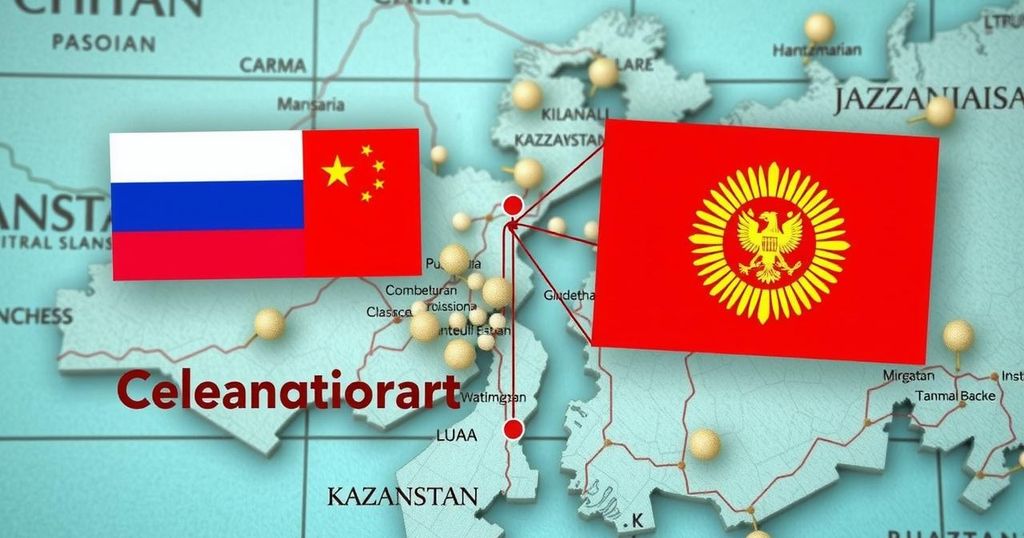Rosatom is divesting stakes in uranium projects in Kazakhstan to Chinese firms amid increasing Western sanctions due to the Ukraine conflict. Kazatomprom faces operational challenges, while analysts suggest a significant shift towards Chinese influence in the region. Rosatom’s actions reflect diminishing power in Central Asia, raising questions about future collaborations between Kazakhstan, Russia, and China.
The Russian state nuclear corporation, Rosatom, has commenced the divestiture of its stakes in several uranium joint ventures with Kazakhstan’s Kazatomprom, the leading global uranium producer, to companies under Chinese control. This strategic decision arises amidst mounting challenges faced by Rosatom due to Western sanctions, which have been imposed in retaliation for the ongoing conflict in Ukraine. Kazatomprom, while previously reliant on Rosatom, has encountered its own difficulties in marketing uranium to Western buyers due to the association with its Russian partner, raising concerns about operational stability and corporate reputation.
Kazatomprom disclosed that Rosatom’s subsidiary, Uranium One Group, has sold a substantial 49.979% stake in Kazakhstan’s Zarechnoye mine to China’s SNURDC Astana Mining Company and is preparing to transfer a 30% stake in the Khorasan-U joint venture to China Uranium Development Company, part of China General Nuclear Power Corporation (CGN). The Zarechnoye mine, possessing 3,500 tonnes of uranium reserves, along with the Khorasan-U venture, which has reserves of 33,000 tonnes, represent significant assets in Kazatomprom’s development portfolio. Notably, Uranium One’s operations in Kazakhstan produced approximately 4,831 tonnes of uranium in 2023, affirming the importance of these projects despite Rosatom’s diminishing role.
Experts suggest that this divestiture signals a growing Chinese influence in Kazakhstan’s uranium sector, with Ukrainian political analyst Anton Gerashenko positing that “China is pushing Russia out of Kazakhstan’s uranium sector—Russia is gradually losing its influence in Central Asia.” He attributes this shift to the economic weakening of Russia and a broader reassessment of Moscow’s credibility as a regional security provider, especially following the military challenges highlighted by the Ukraine conflict. Nevertheless, there remains some contradiction in expectations, as observers still anticipate Rosatom’s involvement in the future construction of Kazakhstan’s inaugural nuclear power plant, potentially within an international consortium alongside firms from China, South Korea, and France.
Consequently, while Kazakhstan appears to navigate a complex geopolitical landscape, ensuring that it maintains relationships with both Russia and China, the sale of stakes by Rosatom could be perceived as an emblematic indication of diminishing Russian influence over Kazakhstan’s nuclear resources, underscored by historical conflicts over uranium market control initiated over a decade ago. The irony of this situation reflects a significant shift in the dynamics of regional power, with implications for both Kazakhstan and its international partnerships moving forward.
The backdrop to this development involves Rosatom’s increasing complications in international engagements, particularly due to Western sanctions that have emerged from hostilities linked to the Ukraine crisis. Kazatomprom faces its own set of challenges as a result of its growing association with Rosatom, which has affected its credibility and ability to sell uranium to Western markets. Azimuth projections indicate a changing international landscape for uranium trade, particularly as relationships with strategic partners, such as China, intensify and realign under current geopolitical pressures.
In summary, Rosatom’s sale of stakes in Kazakhstan’s uranium projects to Chinese entities underscores a significant shift in the influence dynamics within Central Asia, largely driven by the geopolitical repercussions of the Ukraine conflict. This transition not only affects the operational strategies within the uranium sector but also reflects broader economic and political trends that are reshaping alliances and resource control in the region. Predictions regarding future collaborative efforts in Kazakhstan’s nuclear sector reveal a complicated interplay between Russian and Chinese interests, with the path forward remaining uncertain.
Original Source: www.intellinews.com






